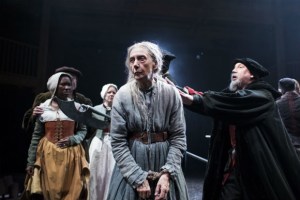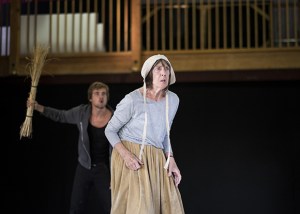The Witch of Edmonton (Swan Theatre, RSC)
Eileen Atkins stars in the final production in Erica Whyman’s ”Roaring Girls” season at the RSC
It is a curious feat that Eileen Atkins, returning in fine form and fettle to the Royal Shakespeare Company to play a dowdy old witch and scapegoat, should come across as the most powerfully sensible person on the stark mad stage of the Swan.
Gregory Doran‘s revival of a Jacobean collaborative effort by Thomas Dekker (who wrote the best part of the play, the documentary tale of the real-life witch and her devil dog), John Ford (the warped love story of a bigamist buckling under economic pressure) and William Rowley (local yokels and morris dancers), is less than a glorious rediscovery. But it does have a point and a purpose.
That is, to show how somebody else is always to blame. Nowadays, we blame the government, or society, or climate change. Back then, they blamed old women who had outlived their usefulness as mothers and whores and called them witches; every town had one, and they were demonised as eccentric harridans, their houses burned, their lives taken on the scaffold.
The play shows this process in a sly and subtle fashion; well, a sly one, anyway. Young Frank Thorney (Ian Bonar) has impregnated a housemaid, Winnifride (Shvorne Marks), while married to a yeoman’s daughter (Faye Castelow) and is suspended himself between the expectations and demands of his gentleman father (Geoffrey Freshwater). Around him, the country folk are behaving like football hooligans, egged on by a capering nincompoop, Cuddy Banks (Dafydd Llyr Thomas), and one of them, in a striking vignette by Liz Crowther, really does go completely bonkers.
Whenever anyone can’t think what to do next, the old witch gets a good kicking. Atkins, wild-eyed and crazily coiffed, responds by playing up to the role assigned and sets loose her devil dog (Jay Simpson), who actually looks more like a refugee from Cats in a naughty nude body stocking with a bulging codpiece and a springy tail. It’s as though the fears and superstitions of the community have been made real so that even the murder of one of Frank’s wives is a mere blip in an ongoing ritual of dishonesty and sacrifice.
The RSC first presented the play in 1981, with Miriam Karlin as the witch and two new girls – Harriet Walter and Juliet Stevenson – as the wives. Miles Anderson’s dog was a much filthier beast than Jay Simpson’s dance class canine. And the whole show had much more of a grimy suburban London feel about it. Niki Turner’s design of a spiky grey reeds clears the stage for action without helping it much.
That said, Dame Eileen justifies the final choice in Erica Whyman’s Roaring Girls season in the power and presence of her performance. She summons up a terrifying adieu in the worrying of wolves and biting of mad dogs, totally consumed by the role allotted to her by an unjust community in which, it seems, getting away with murder is the order of the day.















